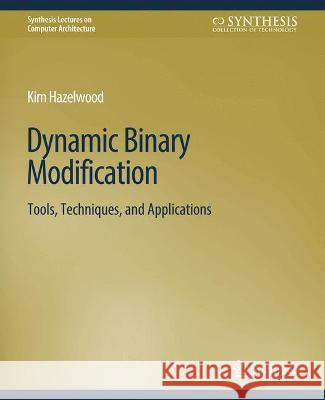Dynamic Binary Modification: Tools, Techniques and Applications » książka
Dynamic Binary Modification: Tools, Techniques and Applications
ISBN-13: 9783031006043 / Angielski / Miękka / 2011 / 67 str.
Dynamic binary modification tools form a software layer between a running application and the underlying operating system, providing the powerful opportunity to inspect and potentially modify every user-level guest application instruction that executes. Toolkits built upon this technology have enabled computer architects to build powerful simulators and emulators for design-space exploration, compiler writers to analyze and debug the code generated by their compilers, software developers to fully explore the features, bottlenecks, and performance of their software, and even end-users to extend the functionality of proprietary software running on their computers. Several dynamic binary modification systems are freely available today that place this power into the hands of the end user. While these systems are quite complex internally, they mask that complexity with an easy-to-learn API that allows a typical user to ramp up fairly quickly and build any of a number of powerful tools. Meanwhile, these tools are robust enough to form the foundation for software products in use today. This book serves as a primer for researchers interested in dynamic binary modification systems, their internal design structure, and the wide range of tools that can be built leveraging these systems. The hands-on examples presented throughout form a solid foundation for designing and constructing more complex tools, with an appreciation for the techniques necessary to make those tools robust and efficient. Meanwhile, the reader will get an appreciation for the internal design of the engines themselves. Table of Contents: Dynamic Binary Modification: Overview / Using a Dynamic Binary Modifier / Program Analysis and Debugging / Active Program Modification / Architectural Exploration / Advanced System Internals / Historical Perspectives / Summary and Observations











